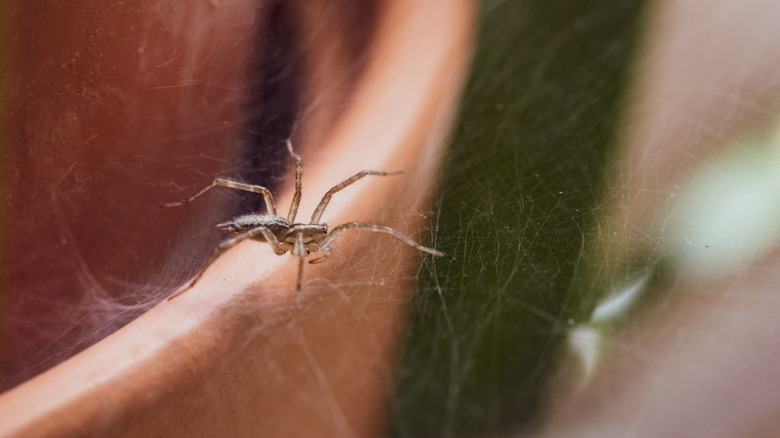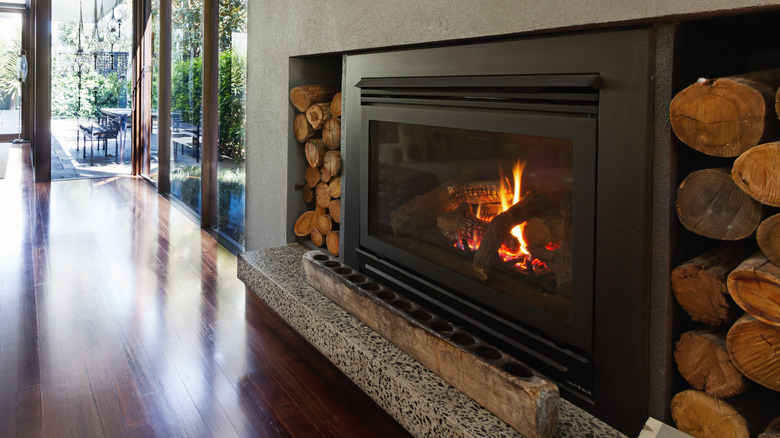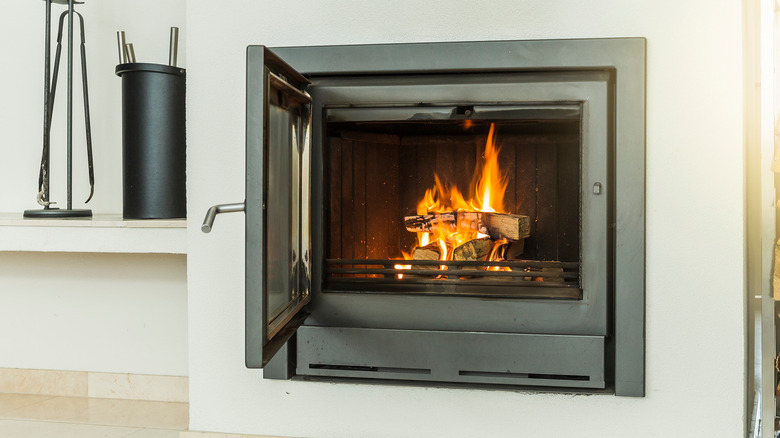The Fireplace Mistake That May Be Inviting Spiders Into Your Home
We may receive a commission on purchases made from links.
Have you noticed an uptick of spiders in your house this winter? While they might be coming in due to the dropping temperatures outside, the real mystery is how they're getting into your home in the first place. You may have done a general sweep of your home for cracks and gaps near window frames and floorboards, but there are more places that you should zero in on: namely, your fireplace. While you might think the crackling fire will deter pests from entering through the firebox, think again. If you don't have a door over your fireplace, you're giving them an easy way to get inside your home — especially if they've been hiding out in your firewood and it's time for them to head somewhere safer.
Of course, fireplace doors are an asset for all sorts of reasons. They not only help contain any rogue embers but also stop cold air from coming down the chimney and into your home. But another added benefit is that they act as a protective barrier between you and any pests that might wander in from outside. Both pest control companies and fireplace experts recommend installing a fireplace door to keep pests out of your home, so the suggestion has some weight to it. If you only have a grate decorating your hearth, spiders can easily bypass the freestanding barrier and get into your living room. Instead, you need a proper door that seals the opening, stopping even the smallest arachnids from sneaking in.
Why fireplace doors are effective at keeping spiders out
Spiders seek warm, dark areas to build their webs, so they will gladly leave the frigid outdoors to set up shop in your chimney or the attached living room. And there's more than one way for spiders to use your fireplace as an entrance point to your home. One obvious method is by crawling down the chimney or through cracks in the mortar, but they might also be coming in via your firewood. If you store your wood outside, always check if there are any bugs on it before bringing it indoors. Chances are, there's a sneaky spider or two on the logs that will immediately jump ship and look for an optimal place to build its web.
If you've installed a fireplace door, the spider will stay sealed inside the box and won't gain access to your living room or space. A properly fitted fireplace door is either made from tempered glass or mesh metal, and it closes snugly against the firebox, sealing off its contents. In fact, some glass doors seal closed so well that shutting them is another way to extinguish your dying embers since they cut off oxygen flow to the fireplace. A spider will have little chance of squeezing through one of these.
Different fireplace doors to consider
If spiders are sneaking in through your hearth, there are three types of fireplace doors you can consider getting: cabinet doors, bi-fold doors, and bi-fold doors without tracks. Cabinet doors function just as their name suggests. The glass door swings open like a cabinet door, whether from only one side or as two doors opening down the middle. Bi-fold doors are on tracks and fold in on themselves when they open. They're great for smaller rooms since they take up less space when open and remove the risk of the door swinging open and hitting the fireplace wall. Bi-fold doors without tracks similarly fold in on themselves to open but also open like a cabinet door; this makes them more compact than a cabinet door, but allows you better access into the firebox than a bi-fold door on a track.
Whichever doors you choose, the close fit is what's most important to keep those spiders out. If your firebox is a standard size, you can simply select your preferred door online and install it once it arrives — retailers like Amazon offer them for about $200 to $500. If you have a smaller or larger firebox, you might need to get a custom one so it properly seals the box; these start at around $500 on a specialty site such as Fireplace Doors Online.


